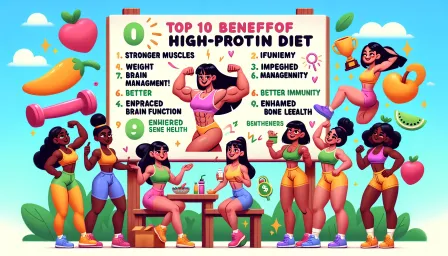The Ultimate Guide to Hormonal Balance and Energy Levels for a Vibrant Life

Discover the ultimate guide to achieving hormonal balance and boosting your energy levels for a vibrant, healthy life. Expert tips and scientifically-backed advice included.
In today's fast-paced world, maintaining optimal hormonal balance and energy levels is crucial for living a vibrant, healthy life. As we navigate through our daily routines, various factors such as stress, diet, sleep, and physical activity impact our body's hormonal equilibrium and energy reserves. This comprehensive guide will provide you with valuable insights and practical tips to achieve hormonal balance and sustain high energy levels.
Understanding Hormonal Balance
Hormones are chemical messengers that regulate numerous functions in the body, including metabolism, mood, growth, and reproductive processes. Imbalances in hormone levels can lead to a range of health issues, from fatigue and weight gain to mood swings and reproductive difficulties.
The Role of Key Hormones
- Estrogen and Progesterone: These female sex hormones play an essential role in regulating menstrual cycles, reproductive health, and mood stability. An imbalance between these hormones can result in issues such as PMS, menopause symptoms, and fertility problems.
- Testosterone: Predominantly known as a male hormone, testosterone is involved in muscle growth, energy levels, and libido in both men and women. Imbalanced testosterone levels can lead to fatigue, decreased muscle mass, and reduced libido.
- Thyroid Hormones (T3 and T4): Produced by the thyroid gland, these hormones regulate metabolism, energy production, and overall metabolic rate. Thyroid imbalances can cause symptoms such as fatigue, weight gain, and temperature sensitivity.
- Cortisol: Known as the stress hormone, cortisol helps the body respond to stress and maintain homeostasis. Chronic high cortisol levels can lead to weight gain, fatigue, and a suppressed immune system.
- Insulin: This hormone regulates blood sugar levels and energy storage. Insulin resistance, a condition where cells become less responsive to insulin, can result in fatigue, weight gain, and increased risk of type 2 diabetes.
Strategies for Hormonal Balance and Sustained Energy
Optimizing Your Diet
Your diet plays a crucial role in maintaining hormonal balance and energy levels. Here are some dietary strategies to consider:
- Balanced Macronutrient Intake: Ensure a balanced intake of carbohydrates, proteins, and fats to support overall health and hormonal function. Aim for complex carbs, lean proteins, and healthy fats.
- Fiber-Rich Foods: Incorporate fiber-rich foods such as fruits, vegetables, and whole grains to support digestive health and blood sugar stability.
- Avoid Processed Foods: Limit the consumption of processed foods, sugars, and unhealthy fats, as they can disrupt hormonal balance and energy levels.
- Stay Hydrated: Proper hydration is key to maintaining energy levels and supporting metabolic processes.
- Include Antioxidants: Foods rich in antioxidants, such as berries, nuts, and leafy greens, can combat oxidative stress and support hormonal health.
Managing Stress
Chronic stress can wreak havoc on your hormones and energy levels. Implementing stress management techniques can significantly improve your well-being:
- Mindfulness and Meditation: Regular mindfulness practices and meditation can reduce stress, lower cortisol levels, and improve mood.
- Regular Physical Activity: Exercise releases endorphins, which help counteract stress hormones and boost energy levels. Aim for a mix of cardio, strength training, and flexibility exercises.
- Quality Sleep: Prioritize sleep hygiene to ensure restful and restorative sleep, which is crucial for hormonal balance and energy replenishment. Aim for 7-9 hours per night.
- Limiting Caffeine and Alcohol: Excessive consumption of caffeine and alcohol can disrupt sleep patterns and stress hormone levels.
Supporting Thyroid Health
Ensuring a healthy thyroid function is vital for maintaining energy levels and metabolic rate:
- Essential Nutrients: A diet rich in iodine, selenium, and zinc supports thyroid hormone production and function. Good sources include seafood, nuts, seeds, and leafy greens.
- Regular Monitoring: Periodically check thyroid function through blood tests, especially if you experience symptoms of imbalance such as fatigue, weight changes, or temperature sensitivity.
- Avoiding Goitrogens: Limit consumption of goitrogenic foods such as soy products and cruciferous vegetables if you have existing thyroid issues, as they can interfere with hormone production.
Natural Supplements for Hormonal Balance and Energy
In addition to dietary and lifestyle strategies, certain natural supplements can support hormonal health and energy levels:
Adaptogenic Herbs
- Ashwagandha: This adaptogenic herb helps balance cortisol levels and reduce stress-related fatigue.
- Rhodiola Rosea: Known for its energy-enhancing properties, Rhodiola Rosea can reduce fatigue and improve mental performance.
- Maca Root: Often used to balance sex hormones, Maca root can regulate estrogen and testosterone levels, supporting energy and stamina.
Vitamins and Minerals
- Vitamin D: Essential for hormone production and immune function, adequate vitamin D levels support overall vitality and mood.
- Magnesium: This mineral plays a role in over 300 biochemical reactions, including hormone regulation and energy production. Dark leafy greens, nuts, and seeds are excellent sources.
- Omega-3 Fatty Acids: Found in fish oil and flaxseeds, omega-3 fatty acids support hormone function and reduce inflammation.
Seeking Professional Guidance
While the tips provided can significantly enhance your hormonal balance and energy levels, it can be beneficial to seek professional guidance for personalized recommendations:
- Endocrinologists: These specialists are trained to diagnose and treat hormone imbalances.
- Nutritionists/Dietitians: Professionals who can tailor dietary plans to support your specific hormonal needs.
- Integrative Medicine Practitioners: These practitioners combine conventional and alternative therapies to create comprehensive wellness plans.
Conclusion
Achieving and maintaining hormonal balance and energy levels is a multifaceted process that involves attention to diet, lifestyle, stress management, and professional guidance. By incorporating the strategies discussed in this guide, you'll be well on your way to enjoying a vibrant and energetic life. Remember, consistency and holistic approaches are key to long-term health and well-being.



























